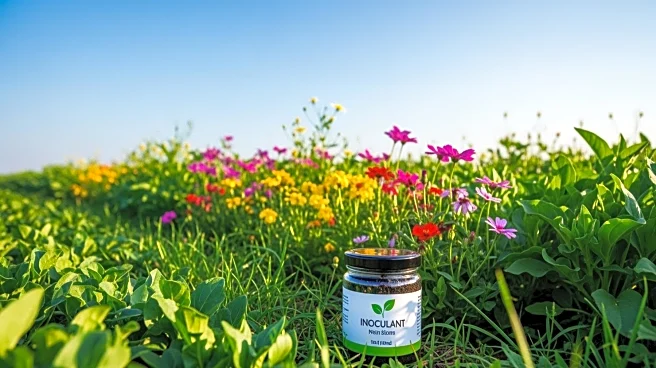What's Happening?
The agricultural inoculants market is experiencing significant growth, driven by increasing demand for sustainable farming practices. Agricultural inoculants, which consist of beneficial microorganisms
like bacteria and fungi, are used to enhance soil health and plant growth. These products are gaining popularity as farmers seek natural solutions to improve crop yields and reduce reliance on chemical fertilizers and pesticides. The market is projected to grow at a compound annual growth rate (CAGR) of 0.67% from 2025 to 2032, influenced by advancements in biotechnology, government support, and growing awareness among farmers. Innovations such as biostimulants and precision agriculture are also contributing to the market's expansion.
Why It's Important?
The growth of the agricultural inoculants market is crucial for the future of sustainable agriculture. As the global population increases, the demand for efficient and environmentally friendly farming practices becomes more pressing. Agricultural inoculants offer a viable solution by improving nutrient availability and soil health, which can lead to higher crop yields without the negative environmental impact of chemical inputs. This shift towards sustainable practices is supported by government regulations and subsidies, encouraging farmers to adopt bio-based products. The market's expansion is likely to benefit both the agricultural sector and consumers, as it aligns with the growing trend towards organic and eco-friendly food production.
What's Next?
The agricultural inoculants market is expected to continue evolving with advancements in biotechnology and digital agriculture. Companies are focusing on developing enhanced formulations that improve the effectiveness and ease of application of inoculants. As precision farming technologies become more widespread, farmers will be able to apply inoculants more efficiently, maximizing their benefits. Additionally, the integration of inoculants with biostimulants is anticipated to provide synergistic effects, further boosting plant health and productivity. The market's growth will likely be supported by ongoing research and development efforts, as well as increased education and awareness among farmers.
Beyond the Headlines
The rise of agricultural inoculants reflects broader shifts in the agricultural industry towards sustainability and innovation. As farmers increasingly adopt these products, there may be long-term changes in farming practices, with a greater emphasis on soil health and reduced chemical usage. This transition could have ethical and environmental implications, promoting biodiversity and reducing pollution. Furthermore, the market's growth may influence cultural attitudes towards food production, encouraging consumers to prioritize organic and sustainably sourced products.









